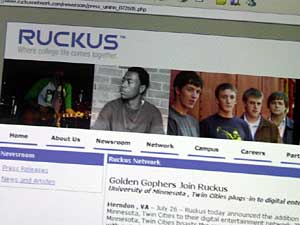|
Audio
Photos
|
July 27, 2005
In an effort to curb illegal music and video downloading, the University of Minnesota is signing with a Virginia-based online company to provide students with songs and movies. The Ruckus network is the second online media source the U of M is working with. Ruckus aims its discounted download network specifically at the college student market.
St. Paul, Minn. — The connection between the University of Minnesota and the Ruckus downloading service can be traced ultimately to the music industry's efforts to hold college campuses responsible for illegal downloading by students.
Campuses have the technology and the market of young music listeners to make university network servers hubs for unauthorized distribution of copyrighted music. The U of M's Chief Information Officer Steve Cawley says the Ruckus network's three dollar a month subscription gives students the ability to get music in a responsible way.
"Ruckus is just targeted at this college market so they really understood that a very low price point was critical," he said. "And then we also thought it was a great opportunity to educate students about these legal options."
For another three dollars, students can also download movies. The U already offers the Rhapsody service which does not offer downloads but lets subscribers listen to music selections while they are connected to the Internet. Both Rhapsody and Ruckus grew out of discussions by the Campus Action Network, a recording industry effort led by corporate giant Sony. Campus Action encourages universities to turn students toward a more legal means of acquiring music.
One of Ruckus' pilot users was Alfred State University in Alfred, New York. Deborah Putnam, Alfred State's Vice President for Administration and Technology Services calls Ruckus a success on her campus. She says more than 70 percent of dorm students are active users.
"One of the things we wanted to teach our students is that it's just plain wrong to do illegal downloads of movies and music and other copyrighted materials," she said. "We wanted to find a way to make it very easy for them to do the right thing because it's already easy for them to do the wrong thing. It's out there. It's well advertised. Kids know about all the illegal software."
The discounted subscription for the service is built into the students' residence hall fees. Alfred State adds additional incentive: students caught downloading illegally are placed on a much slower Internet connection.
At the University of Minnesota, the Ruckus system will be available to both on- and off-campus students. Mark La Croix is the outgoing Program Director for student station Radio K. He says the U of M is clearly intent on steering students away from the readily available services like eDonkey and Gnutella that let people send copyrighted music to each other without paying.
"We have it on our minds," he said. "Is it right? Because there are all the free peer to peer networks that are available and are sometimes easier to use than the pay services. But there is that question of is that right to do."
The main drawback of Ruckus is the song downloads do not work on the popular iPod portable digital music player. U of M sophomore and iPod user Marcus Lewis says Ruckus sounds great, but it's not something he'll use.
"If I listened to music on my computer more it would be a great deal," he said. "But since the stuff I put on my computer I put on my iPod with the sole purpose of putting it on my iPod, it's not a great deal."
Lewis says that iPod factor could be a big hurdle for a lot of university students.
"In some capacity, every household I know has an iPod," he said.
The university's Cawley says he's aware that Ruckus will be a tough sell to hard core iPod users, but he says he believes enough students will use the service to make it worthwhile. Either way, he says the university has no financial stake in the deal.




